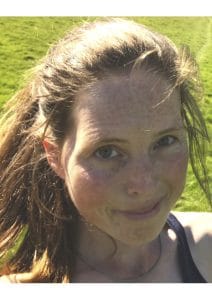 Emma Ladds is an GPST4 at Eynsham Medical Group, Oxfordshire, and an Academic Clinical Fellow in Primary Care at the University of Oxford. She is on Twitter: @LaddsEmma
Emma Ladds is an GPST4 at Eynsham Medical Group, Oxfordshire, and an Academic Clinical Fellow in Primary Care at the University of Oxford. She is on Twitter: @LaddsEmma
‘How are you doctor? I was sorry to hear you’d been unwell.’
I looked across at the woman sitting across from me. A surgical mask obscured most of her face above the thick scarf covering the angry scar on her neck but her eyes were smiling and kind, tinged with real concern.*
A thousand thoughts ran through my head. In reality, I was still tired after COVID-19 and numbed by the backlog of work I had found on my return. I had a packed day full of emotionally intense patients and my head was full of heart wrenching tales of Ukrainian refugees, messages from colleagues worrying about staffing weekend shifts, and whether I would be able to find any patients at short notice to come and teach medical students tomorrow. Really, I just wanted to go back to bed!
I smiled back at her, invisible behind my mask, and reached out to touch her arm, ‘Oh that’s so kind of you. Not so bad. How are you?’
***
It was with great sadness I read the Long Read article in The Guardian published on 22nd February by the chair-elect of the RCGP, Dr Clare Gerada,1 in which she mourns the ‘horrible erosion’ of the general practice profession. The emotional exhaustion of Dr Gerada’s last out-of-hours shift is very familiar. She describes the challenge of medically complex patients, whose care is complicated by poor communication between overly stretched services and reduced availability of community support structures like cottage hospitals, the frustrating expectations of centralised ‘call centres’, and a relentless workload. Above everything, she laments the decline of personal relationships she enjoyed with such patients at the outset of her career and the resultant shame and helplessness that sometimes arise from their absence.
Like Dr Gerada, I too am the daughter of a general practitioner.
For many years the local practice was my second home. I can remember when practices covered their own on-call sessions. As a child they were ‘in-and-out weekends’, and I would always long for more ‘ins’ than ‘outs’. Like Dr Gerada I remember being taken on home visits and impromptu consultations in the supermarket aisles. I also remember Christmas chocolates, turnips from a local farmer, and every year, a bag of rather horrible, crocheted bed socks from an older lady who made them for ‘the doctors’ children’. Although we fought over the least garish options, we were very sad when she died.
The presents have dwindled over the years as patients have passed away but the gratitude in the many cards is still as heartfelt. The importance of ‘their’ GP in many patients’ lives is plainly evident.
Like Dr Gerada, my mother was also my inspiration, role model and teacher, and still is. As I write, on a Sunday morning, she is in her practice doing an ‘extended hours’ clinic.
Unlike Dr Gerada, I am at the very outset of my General Practice career. However, I too am a ‘traditional’ GP. I believe in the partnership model of general practice because I work in an area where I see its value for my population. I believe in different modes of access, largely based on patient preference but pragmatically limited by capacity. I believe in decentralized autonomy to allow local determination of systems and services according to the needs of, and in collaboration with, our populations. Above all, I believe in relationships and continuity of care with my patients. I still believe, perhaps naively and despite the challenges, that these values can be achievable today.
***
My first patient that morning came because of shoulder pain. She had just had major surgery so this wasn’t surprising, but she was a stoical, no-nonsense lady and I wanted to be sure there were no complications. I also knew her well and thought the psychological upheaval of her diagnosis might be easier to discuss in person. A part of me also acknowledged that I had worried about her having the operation and would like to see her for my reassurance.
She bounced in – as she usually did – and opened – as she usually did – with an enquiry about my health.
***
As I finished medical school I had no desire to be a GP. I was going to be a surgeon – a hand surgeon. I loved the creativity and ability to ‘fix’ people. There is nothing more satisfying than suturing a wound or relieving the pain of an infected finger. Restoring function to the part of a person that allows them to ‘do what they do’ and so ‘be who they are’ made my heart sing. But I hated the long operations and relentless on-calls. I missed the ‘human’ part of medicine.
Returning to general practice felt like coming home. I enjoyed going to work. For 12 months I relished being a trainee, passing my exams and building relationships with the patients on ‘my’ list. Then COVID-19 struck and overnight, I became isolated. In the uncertainty of the impending pandemic and desperate to keep the staff safe and service functional, intermingling was restricted, social distancing and masking strictly enforced, and as mandated by NHSE, all appointments became remote. As the first lockdown began to bite and our nursing home death tolls rose, I was passing days at a time without speaking to another human in person. Never have I been lonelier.
While the trauma and agonies experienced by hospital staff cannot be emphasised enough, the majority of COVID-19 cases never went to hospital. Primary care teams not only dealt with these patients but also those who could not be referred during the acute pandemic, many of whom now languish on waiting lists, while also delivering much of the COVID-19 vaccination programme. Additionally, we were continually readjusting systems in response to fluctuating national policies and media pressure. Perhaps the most draining change has been the surge in anxiety, stress and social problems amongst adults and children – all of which are unique in nature and each equally heartbreaking. With increasing pressure on appointments and reduced opportunities for face-to-face contacts it has been harder, particularly for newer GPs, to provide the reassurance of relationship-based care, resulting in a sense of helplessness, fatigue, and frequently anger about the inadequacy of the support we are offering.
This is the frustration that emanates from Dr Gerada’s article. This is not the general practice of my childhood – and I hope not the general practice of the future.
The current challenges for individual GPs and practices are stark. In real terms the GP workforce is declining and demand escalating thanks to COVID-19, digital access and associated expectations, and an aging, often multimorbid population. This vastly outstrips the funding support. An increasingly complex evidence base underlies clinical decision-making while the national policy direction frequently lies against localised autonomy, resulting in ‘one-size-fits all’ directives that hinder the development of services to meet the specific needs of particular populations. Thus GPs are frequently left carrying the risks and uncertainties for system inadequacies and the associated stress takes its toll.
Much change could be positive and enable smarter, proactive care. Technological developments and multidisciplinary working for example, can be great – if appropriately deployed and resourced. However,
for now, we may need to decide on the core elements of general practice that are truly valued by patients and GPs and strengthen these, while reluctantly letting go of others.
Out-of-hours care and regular home visiting may go this way. It is a conversation that should differ across the country, depending on population demography, local resources, and need. For some, ease of access and convenience may be valued above the proven benefits of continuity, while for others these prevail. What matters is transparency about the pros and cons of alternatives (including private options), and the compromises we are forced into by funding, staffing, and system limitations.
GPs are also human. The last two years have been acutely stressful and painful for many but the pressures in primary care are only increasing. The possibility for a better work-life balance and portfolio career options draw doctors to the profession adding richness and wealth to our practice. I hope I am a better GP because of my research and teaching; I know my colleagues are better GPs because of their work in psychiatry or women’s health and the important time they spend with their families. While it may be frustrating for patients not to have their preferred doctor accessible every day, these components allow us to flourish and sustain our GP roles. We need to be honest with patients about this.
Unlike Dr Gerada, I am not despondent about general practice. While I understand patients’ experiences vary and have done so even more over the past two years, I still firmly believe in our profession and its potential. I still feel proud to be a GP.
***
As she stood up to leave my patient asked, almost offhand, ‘I don’t suppose you’ve had the results from the operation samples have you? I haven’t heard anything.’
‘Oh’, I said, surprised, ‘that’s been a while. No but let me log in to the hospital.’
She sat, anxiously, on the edge of the seat, hands tightly gripping her clutch bag. The system as usual took its time. I read the results anxiously. I really, really didn’t want to have to tell her the cancer had spread.
‘No evidence of metastatic carcinoma’, I read out loud to her from the report, turning the screen so that she could read it too. I felt a lump rise in my throat.
‘Oh’, she said, her voice catching, ‘oh. That’s good news.’ Our eyes met, above our masks. All of them were shining slightly.
As I left that evening I found a bunch of tulips for me at reception. ‘Thank you.’ the note simply read.
*Written patient consent was obtained to share this narrative
Reference
1. Gerada, C. ‘In my 30 years as a GP, the profession has been horribly eroded’. The Guardian 2022; 22 Feb: https://www.theguardian.com/society/2022/feb/22/my-30-years-as-gp-profession-horribly-eroded-clare-gerada (accessed 11 Apr 2022).
Featured image by Libby Penner on Unsplash






